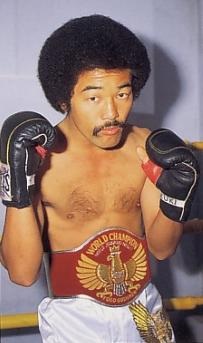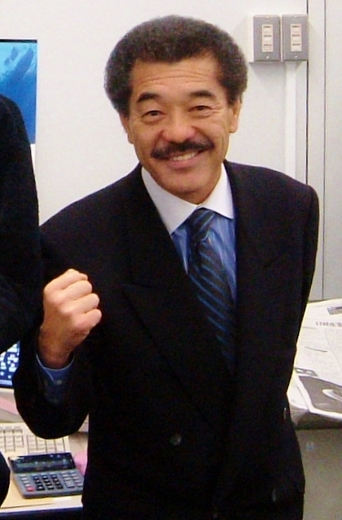Yoko Gushiken

Courtesy of Boxrec.com
When we talk about the most popular Asian boxers of all time it's hard to ignore the excellent, fun and incredibly memorable Yoko Gushiken (23-1, 15) a fighter who really a new standard for popularity amongst boxers in his home country, and for hair styles with his infamous afro bush moustache.
Born in Okinawa in 1955 Gushiken would originally aspire to play baseball, though would turn to boxing in his teens, a move that would later turn out to be the right one for the man who would have a career as legendary as any other in Japanese boxing.
Having chosen boxing as his sport Gushiken would quickly excel and managed to run up an impressive amateur record of 62-3 (50) dominating the national Mosquito division, which we believe is around 88lbs, at the high school level.
So impressive was Gushiken as an amateur that there seemed no reason for him to continue on the amateur circuit beyond the end of 1973 and instead of staying in the unpaid ranks he would turn professional aged just 18.
On his professional debut Gushiken would out point Koichi Maki, a fighter who was fighting for the 7th time as a professional. Gushiken's performance was impressive for such a young fighter though he did what was expected and repeated the same trick less than 4 months later as he out pointed Maki for a second time.
Interestingly several years after Gushiken beat him, Maki would later go on to become a Japanese Flyweight champion.
Gushiken would add his third career victory just a few months after the decisions over Maki as he stopped Tadahiro Mihara in round 5 and by the summer of 1976 he had raced out to an impressive 8-0 (5) record against mostly domestic opponents.
Born in Okinawa in 1955 Gushiken would originally aspire to play baseball, though would turn to boxing in his teens, a move that would later turn out to be the right one for the man who would have a career as legendary as any other in Japanese boxing.
Having chosen boxing as his sport Gushiken would quickly excel and managed to run up an impressive amateur record of 62-3 (50) dominating the national Mosquito division, which we believe is around 88lbs, at the high school level.
So impressive was Gushiken as an amateur that there seemed no reason for him to continue on the amateur circuit beyond the end of 1973 and instead of staying in the unpaid ranks he would turn professional aged just 18.
On his professional debut Gushiken would out point Koichi Maki, a fighter who was fighting for the 7th time as a professional. Gushiken's performance was impressive for such a young fighter though he did what was expected and repeated the same trick less than 4 months later as he out pointed Maki for a second time.
Interestingly several years after Gushiken beat him, Maki would later go on to become a Japanese Flyweight champion.
Gushiken would add his third career victory just a few months after the decisions over Maki as he stopped Tadahiro Mihara in round 5 and by the summer of 1976 he had raced out to an impressive 8-0 (5) record against mostly domestic opponents.
|
Despite having a perfect record of 8-0 he had only really been fighting domestic level opposition. He would change that in October 1976 when he leaped up from the domestic stage to the world stage to face the experienced and hard hitting Juan Antonio Guzman of the Dominican Republic.
Guzman, known as “Little Foreman”, was the reigning WBA Light Flyweight champion and a fighter with a very impressive 25-1 (20) record. Despite the clear experience edge in favour of the champion, Guzman had next to no answer for the busy Gushiken who worked him over with busy jabs and hooks. The power of Gushiken was evident from the second round, a round in which he dropped Guzman twice. Although Guzman did manage to see out the second round against Gushiken he really was outclassed and would be dropped again in round 4 before being stopped in round 7 from a devastating right hand. Gushiken, who had been a professional for less than two and a half years, had not just demolished Guzman but had taken his world title as a result and become a world champion in just his 9th professional contest. Gushiken would make his first world title defence just 3 months layer as he took on Panamanian Jaime Rios. Rios, had himself been a former champion and was much more experienced than Gushiken. He used his experience well and managed to drop Gushiken in round 3 and opened several cuts on the Japanese fighter as he took an early lead. Despite the good start for Rios, Gushiken would fight back with real intensity and managed to do enough enough through the middle and later rounds to just edge a split decision. The bout with Rios was controversial with neither man being happy. Rios was hugely annoyed at the scores and felt he had done more than enough to claim the title, Gushiken however was adamant that the cuts had come from headbutts. The result of this bout would, several fights later, lead to a rematch but more about that later. Having only narrowly defeated Rios things didn't get easier for Gushiken who was pushed close in his second defence as he narrowly defeated talented Venezuelan Rigoberto Marcano. Again Gushiken had to accept a majority decision with his engine down the stretch just managing to see him picking up the victory. After two tough and hard decisions over Latin American's Gushiken would make light work of his first Asian challenger, Thailand's Montsayarm Haw Mahachai. Gushiken managed to establish his rhythm from the off before putting his foot on the gas in round 4 and knocking the Thai out later in the round. Gushiken seemed to develop from a boy to a man after the victory over Mahachai and in his next defence he would dominate Filipino Aniceto Vargas. Vargas was given several counts before being stopped in round 14 as Gushiken really began to hammer on an outclassed opponent. Having defended his title 4 times in total Gushiken would then rematch Jaime Rios. Rios, who had bitterly disputed the loss in their first fight, again had his share of success as he began to swell both of Gushiken's eyes. Gushiken, for his part refused to let Rios take advantage of his injury and from round 7 onwards he just took over the contest hammering Rios around the ring until Rios collapsed in his own corner and was saved by the referee. This would be the only stoppage loss in Rios's though he would never be the same fighter afterwards fighting just twice. Following the hard fought stoppage of Rios, Gushiken would then fight in a none title fight stopping Korean national champion Mak Dong Kim in the 6th of a scheduled 10 rounds. This would be Gushiken's only non-title bout after winning the title. Just weeks after defeating Kim the champion was back in action and he'd successfully defend his title once again stopping Sang-Il Chung, the then reigning OPBF champion in 5 rounds. Gushiken. Having already rematched Rios, would score his 7th title defence by taking on Rigoberto Marcano, the man who had given him so many issues in his 2nd defence. This time around Marcano was unable to give Gushiken the same issues he had given him the first time around and, like Rios, he would suffer his first and only stoppage loss, being stopped in the 7th round. The stoppage victory over Marcano was impressively just the first of 4 title defences Gushiken would make in 1979 as he added a 7th round stoppage victory of Alfonso Lopez, who had given Gushiken a really tough bout prior to the stoppage, a dominant decision victory over Rafael Pedroza and a stoppage of Tito Abella. Oddly of the 4 defences he made in the year all of the stoppages came in the 7th round. The activity of 1979 would carry through in to the following year for Gushiken who began by widely out pointing Korean challenger Yong-Hyun Kim, the then reigning OPBF champion. The tough Korean was always in the fight though was never able to do enough to claim the rounds to make the fight as close on the cards. This was followed by an excellent victory over the highly experienced Chilean Martin Vargas. Gushiken's final successful defence came in a gruelling contest with Mexican Pedro Flores. By the end of the bout both men were showing signs of having been in a real war with each other. For many Gushiken was fortunate to retain his title at the end of this bout and their were calls for an immediate rematch between the two. Gushiken, being the warrior he was took the rematch though unfortunately it was one war too much and he retired by his corner after being dropped in round 8. Having suffered his first loss Gushiken would retire from the ring rather than risk his legacy being harmed by any more losses. |
|
|
Despite having retired from active competition in 1981 Gushiken would remain a popular personality with the Japanese public and he would featured on numerous TV's shows following his retirement.
The TV work ranged quizzes to working in the boxing media, something he currently does on occasion for Fuji TV. As well as the TV work Gushiken found a second career in boxing linking up with Japan's first ever boxing world champion Yoshio Shirai to form the Shirai Gushiken Sports Gym (SGS) in 1995. Since it's formation SGS has had several world champions including current WBA female Super Flyweight champion Naoko Yamaguchi, and current WBA”interim” Flyweight champion Koki Eto. In his prime Gushiken was known as an action fighter who seemed to get better as the rounds went on helping him to earn the name of “Fierce Eagle”. Fighting from the southpaw stance Gushiken looked for mistakes and took advantage of them when opponents made them. He was technically capable, tough and had an excellent variety of punches all things that helped him to win and retain his title in such a memorable career. The video below, thanks to Christofides1, shows Gushiken winning the WBA Light Flyweight title from Juan Antonio Guzman. |

